Key takeaways:
- Community learning programs foster connections by bringing individuals together to share experiences and knowledge, enhancing social bonds.
- Participants experience personal growth through skill development and increased confidence, transforming challenges into opportunities for empowerment.
- Engagement in diverse perspectives within these programs promotes empathy and understanding among participants, enriching cultural appreciation.
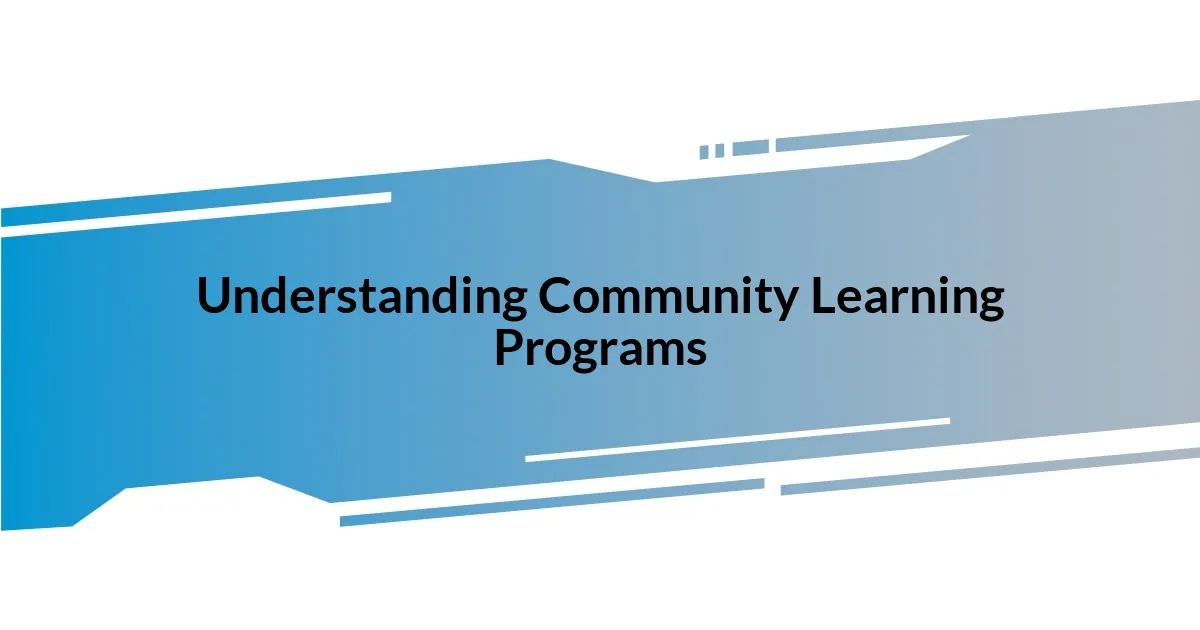
Understanding Community Learning Programs
Community learning programs are essentially structured initiatives that aim to enrich lives through education and shared experiences. I remember the first time I participated in such a program; it was like opening a door to a world of knowledge that I didn’t know existed. Have you ever felt that rush of excitement when learning alongside others who share your passions?
These programs often focus on fostering connections within the community while also addressing specific needs, like literacy, job training, or even cultural appreciation. I recall attending a local workshop on digital skills that not only taught me practical tools but also connected me with people from different backgrounds, each with their own unique story. It made me realize how learning together can break barriers and ignite friendships.
Moreover, community learning programs empower participants by encouraging them to take ownership of their educational journeys. Can you imagine the sense of pride felt by someone who has transformed a skill into a new career option? I’ve seen firsthand how these programs can boost confidence, creating ripple effects of positivity within the community.
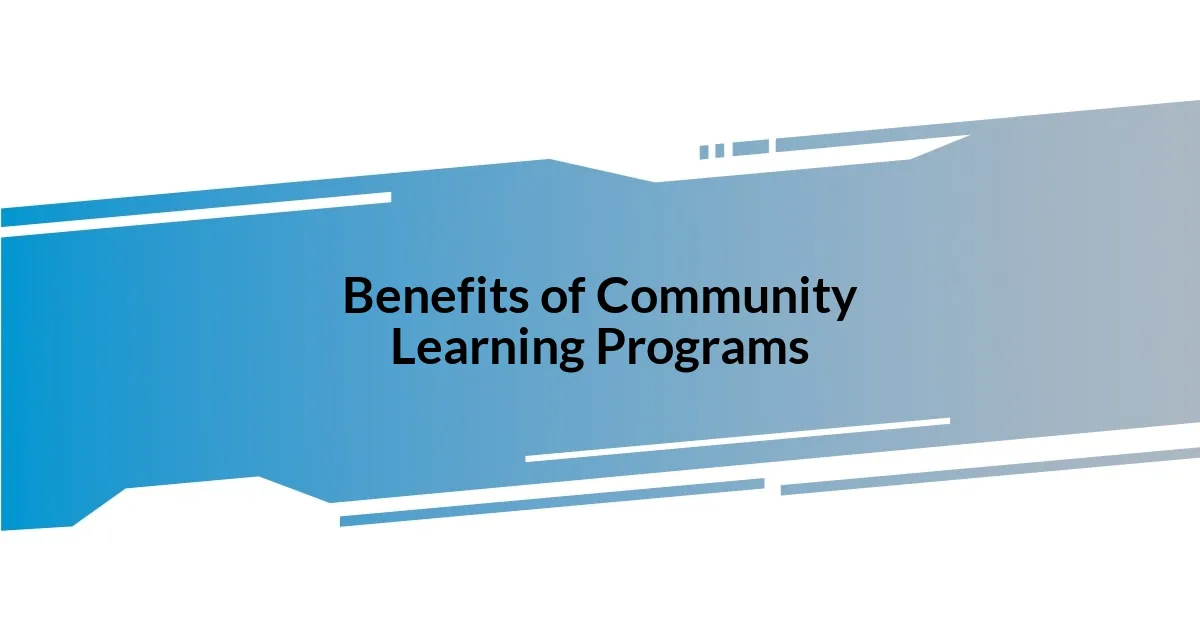
Benefits of Community Learning Programs
Engaging in community learning programs has an array of benefits that reach far beyond knowledge acquisition. I once joined a local gardening program, and it wasn’t just about planting seeds in the ground; it was about planting connections with my neighbors. We nurtured our hobbies together, shared harvests, and even celebrated our efforts with potluck dinners. Those shared experiences helped cultivate a tight-knit community that I now truly feel part of.
Here are some key benefits of community learning programs:
- Enhanced Social Connections: Building friendships with people who have similar interests enriches our communal bonds.
- Skill Development: Participants gain valuable skills that can lead to personal and professional growth.
- Increased Confidence: Learning in a supportive group can significantly boost self-esteem and empowerment.
- Cultural Exchange: These programs often provide a platform for sharing diverse perspectives, fostering understanding and appreciation across backgrounds.
- Accessible Learning Opportunities: Community programs often cater to various age groups and skill levels, making education more inclusive.
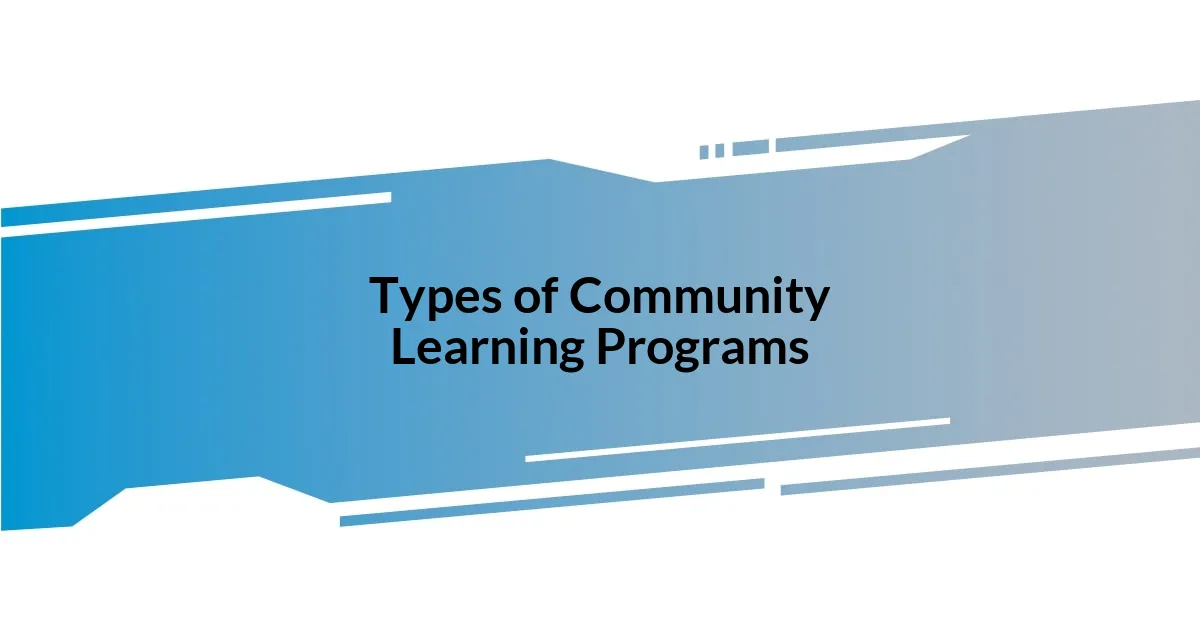
Types of Community Learning Programs
When I think of the diverse types of community learning programs, I can’t help but feel that each serves a unique purpose. For instance, there are tutoring programs focused on improving literacy skills, which can drastically change someone’s life. I remember watching a young student blossom in a reading program; the spark in her eyes when she finally read a book on her own was unforgettable.
Another fascinating type are skill-sharing workshops, where people come together to teach and learn from one another. I once participated in a craft workshop where attendees exchanged techniques for quilting. It was not just about creating a quilt; it was about weaving stories and laughter while we learned from one another. These gatherings showcased how powerful shared knowledge can be, transcending age or experience.
Lastly, cultural exchange programs offer incredible opportunities to appreciate and learn about different backgrounds. One of my most enriching experiences was attending a cultural festival where various communities showcased their traditions. Learning about different cuisines and customs enriched my perspective on the world, fostering a deeper appreciation for our global community. These connections are vital in a world that often feels divided.
| Type of Program | Description |
|---|---|
| Tutoring Programs | Focused on improving literacy and academic skills. |
| Skill-Sharing Workshops | Allow participants to teach and learn skills from each other. |
| Cultural Exchange Programs | Encourage understanding and appreciation of diverse cultures. |
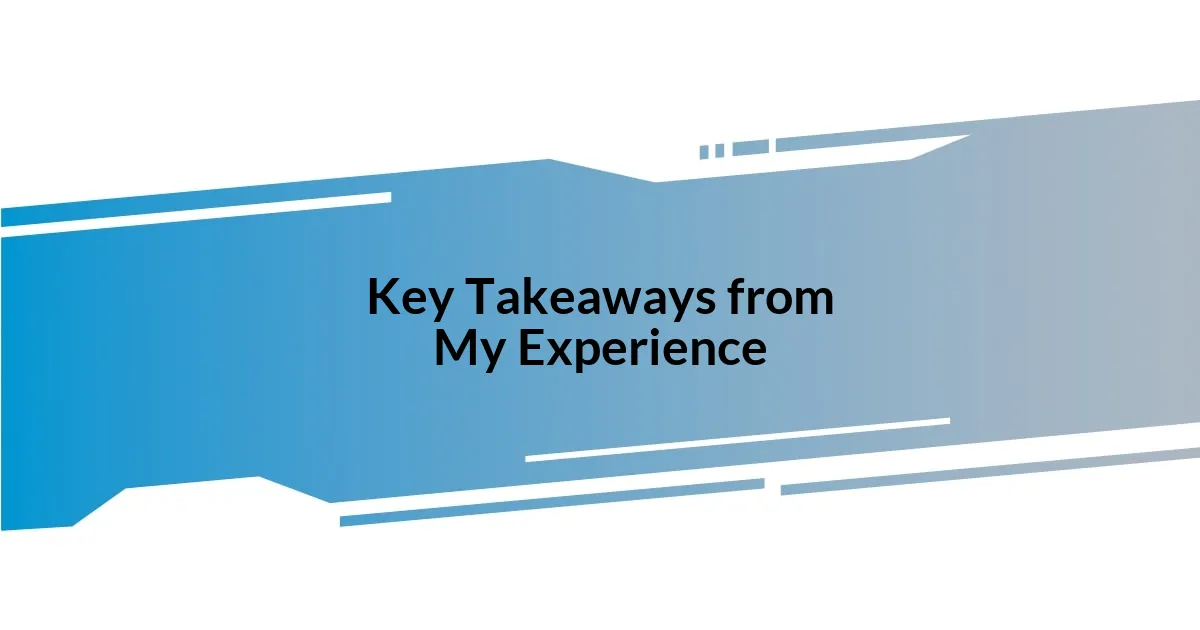
Key Takeaways from My Experience
One of the biggest takeaways from my experience in community learning programs is the profound sense of belonging that develops over time. I remember sitting around a table during a cooking class, each of us sharing our favorite family recipes. It struck me how food, something so universal yet personal, connected us. Hasn’t everyone felt that warmth when they share a meal? It’s those moments of vulnerability that foster lasting friendships and a shared commitment to learning.
Another insight I’ve gathered is the incredible boost in self-esteem that comes from tackling new challenges together. I was once apprehensive about a pottery workshop; the thought of getting my hands messy was daunting. But when I saw everyone struggling yet laughing through their imperfections, I realized that failure is just another step in the learning process. Isn’t it liberating to know that we don’t need to be perfect? Embracing that mindset helped me feel more confident, allowing me to fully immerse myself in the experience.
Lastly, I can’t stress enough the value of diverse perspectives that community programs bring. Being part of a storytelling circle opened my eyes to experiences vastly different from mine. I was moved by the tales of resilience and hope shared by participants from various backgrounds. How can we truly understand each other if we don’t take the time to listen? This exchange of life experiences not only educated me but also deepened my empathy for others, reinforcing that learning is a two-way street.
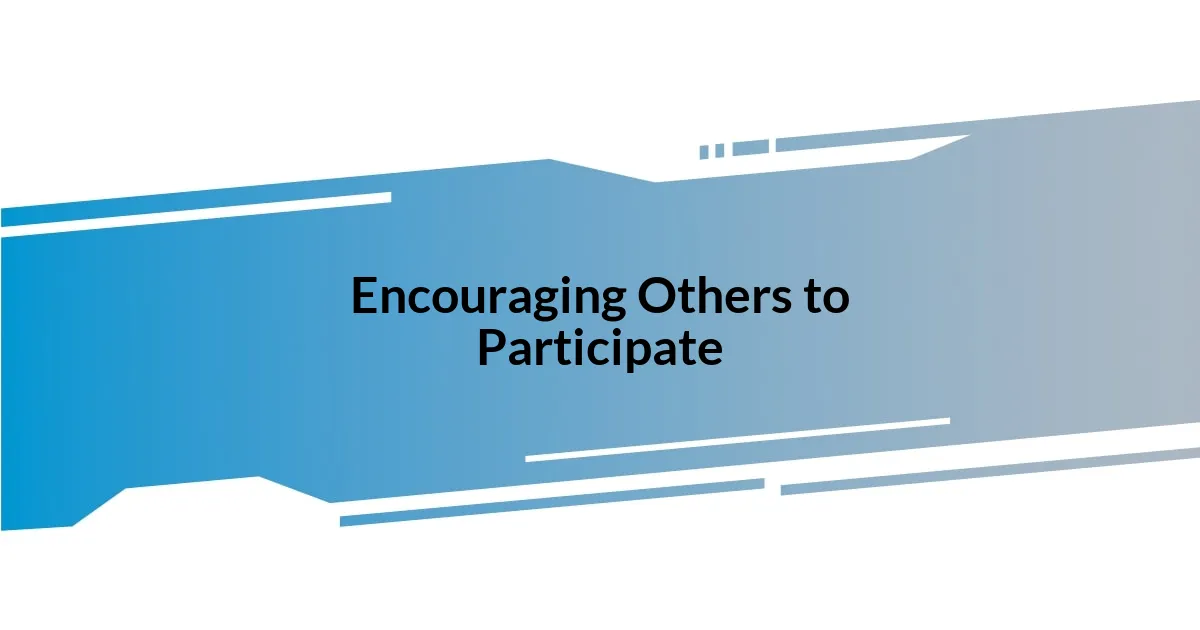
Encouraging Others to Participate
Encouraging others to participate in community learning programs can sometimes feel like a challenge, but I have found that sharing personal experiences can spark genuine interest. When I told my friend about the time I discovered a hidden talent in a painting class, her eyes lit up. She hadn’t considered herself artistic, but hearing about my journey inspired her to join the next session. Isn’t it fascinating how our stories can ripple out and motivate others?
I believe it’s essential to create an inviting environment where potential participants feel valued. One time, I organized a small meet-and-greet for a local gardening workshop. I shared not just what we would learn, but also the laughter that happened when we accidentally planted seeds upside down. This light-hearted approach broke the ice, allowing others to see that learning together could be fun and liberating. How often do we underestimate the power of a welcoming smile and an authentic conversation?
Lastly, showing the tangible impact of these programs can be a compelling motivator. I once shared with my colleagues how a simple language exchange led to a newfound friendship and deep understanding of another culture. The excitement in my voice as I recounted our weekly meet-ups brought them to consider joining myself. Can stories of friendship and growth really motivate participation? I think they absolutely can! When people see how community programs create lasting bonds and memories, they are often more eager to join in.